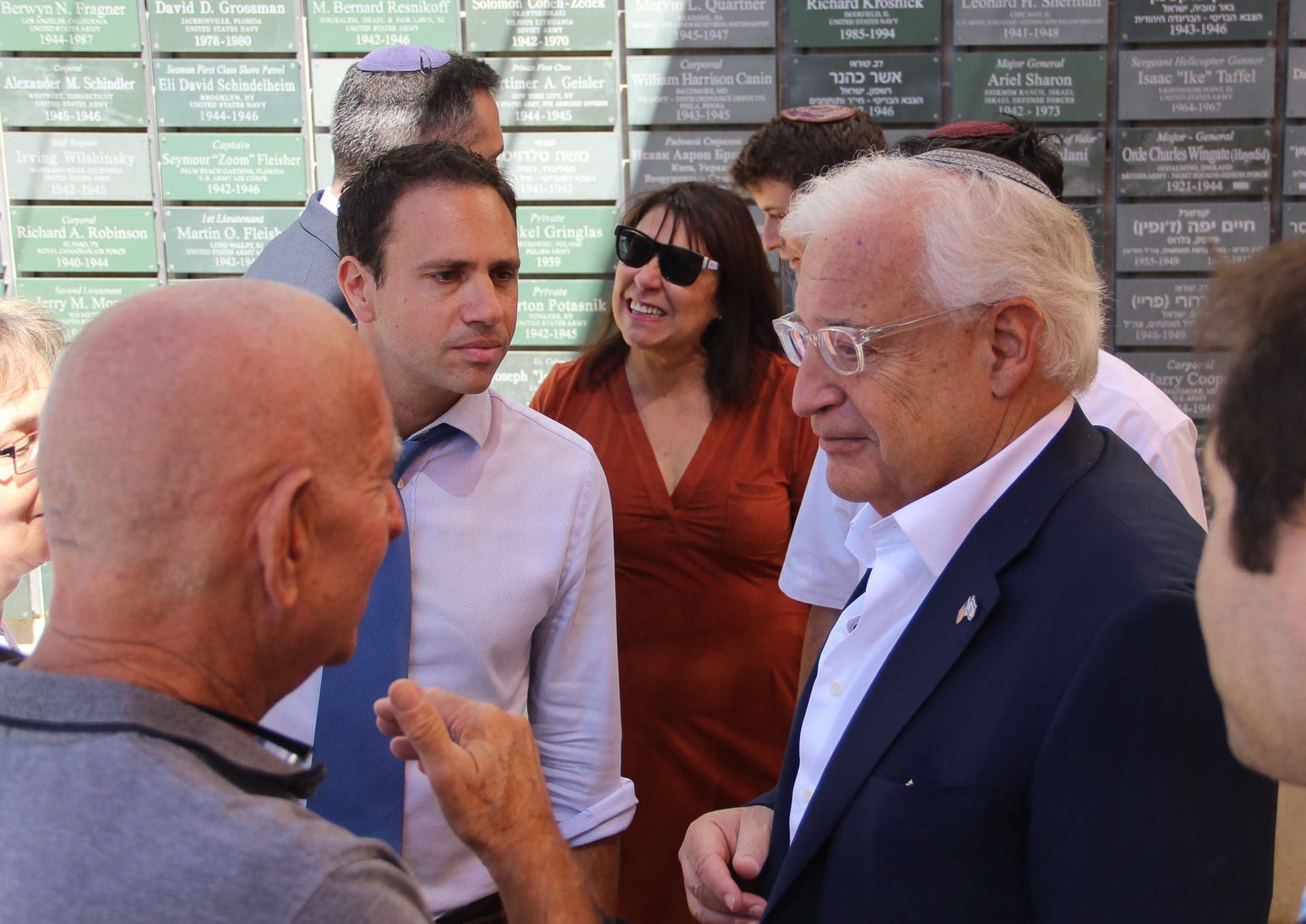Today’s Top Stories
1. Reports suggest that Palestinian Authority President Mahmoud Abbas is considering wresting power away from Hamas by declaring Gaza a “rebel district,” and effectively announcing a state of emergency. Though Abbas’s Palestinian Authority is officially the only Palestinian government, Hamas remains firmly in control of Gaza on a practical level. It is therefore difficult to predict exactly what results this course of action would produce. One possibility is that the current crisis over electricity could expand to shut down banking institutions and even force the evacuation of foreign aid organizations. A more aggressive scenario could involve actual combat between the PA and Hamas, as we saw in the years from 2005 to 2007. Or this could turn out to be nothing more than a “war of words.” Yet the ongoing electricity situation suggests that the parties are becoming more aggressive toward one another than they have been at any time since 2007. At this point, all is mere conjecture.
2. The civil war in Syria spilled into Israel again as, “UN observers in Golan come under cross-border fire.” Israel responded with two strikes against Assad regime positions, once again implementing PM Netanyahu’s self-described “zero tolerance policy” with regards to “‘any kind of ‘trickle’ — from mortars, rockets or spillover fire — on any front.” Knesset Speaker Yuli Edelstein on Thursday warned Russian Foreign Minister Sergey Lavrov that Israel considers such rocket-fire into Israeli territory to be a “red line.” Israel did not indicate it believes Russia is actually behind such attacks: presumably the message was delivered to Russia because Israel sees the country as a conduit for communicating such messages to the variety of Syrian forces that are active on the ground.
3. Prison parole board grants early release to ex-PM Ehud Olmert. The panel approved the early release after Olmert had served 16 months of his 27-month sentence. The former Israeli PM and Jerusalem mayor was one of eight former officials and businessmen convicted in March 2014 in the Holyland real estate corruption case, which has been characterized as among the largest graft cases in Israel’s history.
4. Men pray in the men’s section and women pray in the women’s section at the Western Wall. So how did The Irish Times get so confused? Read “Western Wall Gender Confusion at The Irish Times.”
Join the fight for Israel’s fair coverage in the news
Israel and the Palestinians
• Plans for an artificial island off the coast of Gaza (“Gaza Island“) are still being entertained by the Israeli government in a move that would provide “Palestinians with humanitarian, economic and transportation gateway to the world without endangering Israel’s security.” The idea put forward by Minister for Intelligence Yisrael Katz would allow for the creation of a number of facilities which would contribute to the strip gaining greater autonomy and becoming self-sufficient.
Washington Post shares this video
• Despite constant news attention to the demolition of Palestinian homes (typically for either illegal construction or in response to acts of terrorism by the inhabitants) it turns out that 60% of all illegal Palestinian homes in the West Bank’s “Area C,” are still standing. This according to Marco Ben-Shabat, head of Area C’s enforcement division. (Area C is a portion of the West Bank that, pursuant to the Oslo Accords, is under Israeli civil and security administration). Shabat’s statement to the Knesset’s Foreign Affairs and Defense Committee sparked a row between MK Aida Touma-Sliman of the Joint List party (a political alliance of four Arab-dominated parties) and MK Moti Yogev of Bayit Yehudi (a religious Zionist political party).
• After helping Hamas with some of its electrical needs (and thus bypassing the Palestinian Authority), Egypt and Hamas are creating a “buffer zone”: a 12-kilometer-long (7.5-mile), 100-meter-wide (330-foot) corridor, consisting of an uninhabited, sandy area. It said construction will take about a month. The purpose of the buffer zone is to prevent the flow of weapons and terrorists between Egypt and Gaza, including members of Hamas, Islamic State (ISIS) and others. There is an important insight in this agreement: apparently Egypt’s assistance with Gaza’s electrical needs does not reflect support for Hamas as it might have appeared at first glance, but rather an opportunity for Egypt to further insulate itself from Hamas’s violence related cross-border activities.
• As a response to the wave of terror attacks that has hit Israel within the last two years, including an attack this month that resulted in the death of 23 year old Jerusalem border police officer Hadas Malka, Israel is implementing some changes, including CCTV drones, at the Damascus Gate to the Old City. (Damascus Gate has been the site of numerous such attacks). Similar terror attacks have taken place across Europe and the Evening Standard raises the point that Europe can learn life saving lessons from Israel’s constantly evolving response to terrorism. According to the Associated Press, in the wake of this increased terrorism in Europe,
There is a heightened awareness and quicker reactions, especially in the hardest-hit countries of France, Britain and Belgium, that would have seemed unthinkable just a few years ago.
HonestReporting addressed the terror attack on Hadas Malka, as well as some of the horribly misleading news coverage, in this video:
Around the World
• Iran used a Star of David as a target for a missile test last year, Israel said Wednesday, distributing satellite images of the site to the United Nations Security Council. Israel’s UN Ambassador Danny Danon said in a complaint to the Security Council:
This use of the Star of David as target practice is hateful and unacceptable….the missile launch is not only a direct violation of UNSCR 2231, but is also a clear evidence of Iran’s continued intention to harm the State of Israel…the targeting of a sacred symbol of Judaism is abhorrent.

• New York Mayor Bill De Blasio has reiterated his commitment to fighting BDS (Boycott, Divestment, Sanctions) and to protect New York’s Jewish community at a time of heightened anti-Semitism and anti-Israel activity. He did so in the presence of “local Jewish politicians, Consul-General of Israel Dani Dayan and other leaders of the community” at an event celebrating Jewish heritage. The self-defined progressive democrat branded BDS an obstacle to peace as it seeks to undermine “economic opportunity for all in Israel, in the region.”
• The High Court of England and Wales ruled in favor of Palestinian activists over the issue of local government investments stating that “the government acted unlawfully in attempting to restrict the Israel boycott.” The decision was made on legal grounds and should therefore not be considered as an endorsement of the BDS movement. Judge, Sir Ross Cranston, was quick to clarify that:
The conclusion reached in the judgment has nothing to do with the political merits of the claimants.
• David Friedman, US Ambassador to the State of Israel, made his maiden speech on Tuesday focusing on the divisions within Judaism rather than the conflict between Israel and Palestinians. Friedman seems to be embracing a new political identity, shifting from his previous negative comments toward left-leaning Jewish organizations: Friedman once called the political activist group J-Street “worse than kapos.” Friedman has since taken a more unifying and inclusive tone, saying:
The key to Jewish unity is that this is not a question of winning, it is a question of mutual understanding, respect and coexistence…I am as guilty as anyone else for having entered the partisan divide that has, unfortunately, to some extent fractured the Jewish community in the US and in Israel. But it has to end.
Though he did not say so specifically, the Jerusalem Post suggests that Friedman was referring to the current dispute over creation of a section for egalitarian prayer at the Western Wall.

• A Time Magazine article entitled, “Were These Holocaust Survivors Forced Into a Ghetto? The Answer Will Determine Their Financial Future,” explores some of the challenges Holocaust survivors face in proving that they are entitled to pensions from the German government. According to one interviewee, Ambassador Stuart Eizenstat of the Conference on Jewish Material Claims Against Germany:
I’m negotiating with people who — and this has been really inspiring — are second and third generation [descendants of World War II era Germans], and yet they continue to feel a moral obligation to help survivors until the last one is gone.
Notwithstanding the importance of this symbolic gesture by the German government, the article’s headline is somewhat misleading: the payments are far too small to actually impact anyone’s “financial future. ”
For example, a typical payment by the German government to a Holocaust survivor is $381 per month. To put this in perspective: a small studio apartment in an American city like Chicago would typically cost close to three times that amount, and that does not even begin to cover the cost of food, utilities and other living expenses.
• J-TV presents a powerful new documentary about the rise of anti-Semitism in the UK’s Labour Party under the leadership of Jeremy Corbyn. The film gives a voice to those who felt ignored in the Chakrabarti Report on anti-Semitism. Presented by Sociology Lecturer of Goldsmiths University – David Hirsh.
• HR’s Managing Editor Simon Plosker appeared on his weekly segment on South Africa’s Chai FM to discuss the latest media stories and bias. You can listen here.
Commentary/Analysis
• Times of Israel’s Haviv Rettig Gur shares his thoughts on the controversy over the so called “Conversion Bill”: apparently it’s not exactly as it seems. The bill is widely seen as an Israeli rejection of non-Orthodox Judaism. Yet according to Gur, a close analysis of the bill shows that it would have little or no effect on Jews obtaining conversions abroad in foreign synagogues (whose conversions would continue to be recognized by the state), nor would it change the status quo for conservative and reform synagogues in Israel (whose conversions are already not recognized by the state).
In fact, the status quo is governed by a 1997 compromise known as the “Neeman framework,” which gives final say on an Israeli conversion to the ultra-Orthodox who control the Chief Rabbinate. The Diaspora side of the compromise confers official Israeli government recognition to local diaspora Jewish movements, including Conservative and Reform. This new bill does not change that. So who’s actually affected by this bill? According to Gur, it is the community of Israeli Modern Orthodox:
Israel’s Modern Orthodox, who often refer to themselves as dati leumi, or national-religious, do not fall under the broadminded openness granted overseas, because they don’t live overseas, nor under the exceedingly (and increasingly) restrictive standards imposed by the Haredim within Israel.
And so, ironically, it is not the Reform or Conservative movements who threaten to topple the Neeman status quo, but these Modern Orthodox.
• Since Oslo (and possibly even before) it has been taken as political gospel that the road to normalization of Israel’s relationships with the Arab world runs through the Palestinians. But a new Israeli strategy seems to be an attempt to bypass the Palestinians. Can it work? Philip Gordon doesn’t think so.
• A group of retired Israeli security officials believe that the key to ending terrorism lies in ending its funding by pressuring the Palestinian Authority. To that end, they have publicly expressed their support for the Taylor Force Act, named for an American West Point graduate killed by Palestinian terrorism while traveling in Israel. Palestinian law and practice provides payments for Palestinians who carry out such attacks: payments which are, in a horrible irony, funded in part by foreign aid provided by the United States, Taylor Force’s own government. The Taylor Force Act would prohibit US funding for such payments. Some Israeli generals have opposed the act, saying it could weaken Palestinian president Mahmoud Abbas, and consequently harm Israeli security.
• Here’s what else I’m reading today . . .
–Yoni Ben Menachem: Whatever Happened to the Term “Palestinian State?”
–Marissa Newman: Knesset speaker, once a prisoner in Siberia, addresses Russian parliament
Featured image: CC0 Pexels;
For more, see yesterday’s Israel Daily News Stream and join the IDNS on Facebook.
Before you comment on this article, please remind yourself of our Comments Policy. Any comments deemed to be in breach of the policy will be removed at the editor’s discretion.


